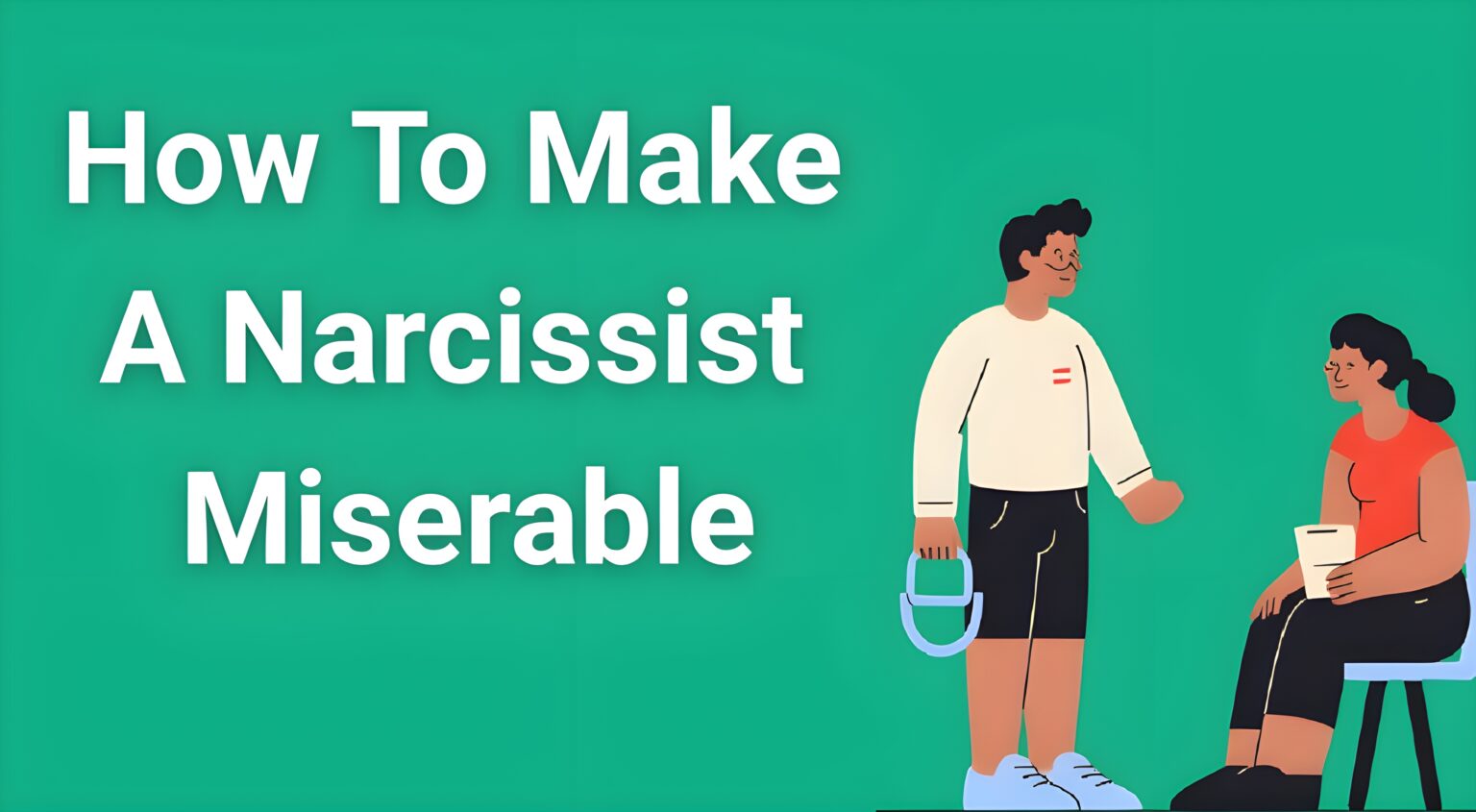You’ve been pushed to your breaking point. The constant manipulation, gaslighting, and emotional abuse from the narcissist in your life has left you questioning your sanity and desperately seeking ways to make them feel even a fraction of the misery they’ve inflicted on you. The urge to make a narcissist miserable isn’t about revenge—it’s about reclaiming the power they’ve stolen from you.
- Understanding Why Narcissists Become Miserable
- 12 Proven Methods to Make a Narcissist Miserable
- The Science Behind These Methods
- Important Safety Considerations
- The Healing Journey: Beyond Making Them Miserable
- Breaking Free Permanently
- Common Mistakes to Avoid
- Building Resilience for the Future
- Frequently Asked Questions
- Conclusion
While the desire for payback is completely understandable, the most effective strategies to make a narcissist miserable actually focus on protecting yourself and building boundaries that leave them powerless over your emotions. When you understand what truly bothers narcissists and how to implement these strategies safely, you can finally break free from their control while watching their manipulative tactics crumble.
Understanding Why Narcissists Become Miserable
Before diving into specific methods, it’s crucial to understand what makes narcissists tick. They thrive on narcissistic supply—the constant validation, attention, and emotional reactions they extract from others. When this supply is threatened or cut off, they experience what experts call “narcissistic injury,” which can make them feel genuinely miserable.
The key insight here is that narcissists are fundamentally insecure individuals who have built elaborate facades to hide their deep shame and inadequacy. When these facades are threatened, their carefully constructed world begins to crumble, leading to intense emotional distress.
12 Proven Methods to Make a Narcissist Miserable
1. Master the Art of Complete Indifference
Nothing devastates a narcissist more than being treated with complete indifference. They crave attention—even negative attention—because it validates their existence and confirms they still have power over you. When you respond to their provocations with genuine indifference, you’re essentially telling them they don’t matter enough to warrant an emotional response.
This means not reacting to their attempts to bait you, refusing to engage in their drama, and treating them as if they’re invisible when possible. The gray rock method falls into this category, where you become as boring and unresponsive as a gray rock when forced to interact with them.
2. Establish and Enforce Ironclad Boundaries
Narcissists hate boundaries because boundaries represent your autonomy—something they cannot control. When you set clear, non-negotiable limits on their behavior and consistently enforce consequences for violations, you’re demonstrating that their manipulation tactics no longer work.
Effective boundaries might include refusing to discuss certain topics, limiting contact to specific times or methods, or immediately ending conversations when they become abusive. The key is consistency—every time they test your boundaries, you must follow through with the stated consequences.
3. Stop Providing Narcissistic Supply
Narcissistic supply is the lifeblood of a narcissist’s ego. This includes compliments, attention, emotional reactions, and even arguments. When you stop feeding their need for supply, they begin to feel empty and desperate.
This means no longer praising their achievements, refusing to react to their provocations, and avoiding any behavior that makes them feel special or important. Initially, they may escalate their behavior to try to regain your attention, but consistency in withholding supply will eventually leave them feeling deflated and powerless.
4. Expose Their Behavior to Others
Narcissists carefully maintain different personas for different audiences. They may be charming and charismatic in public while being cruel and manipulative in private. When you document and expose their behavior to others in their social circle, you threaten their carefully crafted image.
However, this must be done strategically and safely. Focus on factual documentation rather than emotional appeals, and be prepared for them to launch a smear campaign against you. This method works best when you have concrete evidence and trusted allies who can witness their behavior firsthand.
5. Thrive Without Them
Perhaps the most devastating blow to a narcissist is seeing you flourish in their absence. They want to believe they are essential to your happiness and success. When you demonstrate that you not only survive but thrive without them, it challenges their fundamental belief in their own importance.
This involves pursuing your goals, rebuilding relationships they damaged, engaging in activities that bring you joy, and generally living your best life. Share your successes (when safe to do so) and let them see that your life improved dramatically once they were no longer the center of it.
If you’re struggling to break free from the psychological hold a narcissist has over you, understanding the science behind trauma bonding can be life-changing. Many survivors find that their attachment to their abuser feels almost addictive, making it nearly impossible to leave despite knowing the relationship is toxic.
6. Refuse to Participate in Their Drama
Narcissists are drama addicts. They create chaos, conflict, and crisis because it gives them a sense of control and provides the emotional reactions they crave. When you refuse to participate in their dramatic productions, you remove yourself as both audience and co-star.
This means not taking the bait when they try to start arguments, refusing to get involved in their conflicts with others, and maintaining calm professionalism when dealing with them. Your peaceful response to their chaos will frustrate them immensely because they cannot predict or control your reactions.
7. Use Facts Instead of Emotions
Narcissists are skilled at manipulating emotions but struggle when confronted with cold, hard facts. They operate in a world of distorted reality where their version of events is the only truth that matters. When you respond to their accusations or manipulations with factual statements rather than emotional defenses, you disarm their primary weapons.
Keep records of interactions, speak in measured tones, and stick to verifiable facts rather than getting drawn into emotional arguments about feelings or intentions. This approach frustrates narcissists because they cannot gaslight someone who has documentation and refuses to be emotionally manipulated.
8. Become Unpredictable
Narcissists rely on being able to predict and control your responses. They know exactly which buttons to push to get specific reactions from you. When you become unpredictable in your responses, you disrupt their entire playbook.
This doesn’t mean being chaotic or unreliable in general—it means varying your responses to their manipulative tactics. Sometimes ignore them completely, other times respond with facts, and occasionally use humor to deflect their attempts to control you. This unpredictability will drive them crazy as they struggle to regain their psychological advantage.
9. Implement Strategic No Contact
For many survivors of narcissistic abuse, implementing no contact is the ultimate way to make a narcissist miserable while protecting your own mental health. No contact means cutting off all forms of communication and interaction with the narcissist.
This strategy works because it completely cuts off their supply from you while demonstrating that you no longer consider them important enough to engage with. The silence and absence of reaction often drives narcissists to escalate their attempts to regain contact, which only serves to prove how dependent they were on your attention.
When no contact isn’t possible due to shared children or work situations, modified contact with strict boundaries can be nearly as effective.
10. Succeed in Areas They Value
Narcissists often see themselves as superior in specific areas—whether it’s career success, intelligence, attractiveness, or social status. When you succeed in these same areas or surpass their achievements, it threatens their sense of superiority and specialness.
This isn’t about competing with them directly, but rather about pursuing your own goals and excellence. When your success in their valued areas becomes apparent, it forces them to confront the reality that they may not be as special or superior as they believed.
11. Show Genuine Happiness and Peace
Narcissists often derive satisfaction from believing they’ve damaged you permanently. They want to think that their abuse has left lasting scars that prove their power over you. When you demonstrate genuine happiness, peace, and emotional healing, it challenges this narrative.
This involves working on your own healing journey, possibly with professional help, and allowing yourself to experience joy again. Your happiness becomes evidence that their attempts to destroy you have failed, which can be profoundly unsettling for them.
Many survivors find that professional analysis of their situation provides the clarity needed to begin healing. Understanding exactly what type of narcissistic abuse you’ve experienced and developing a personalized recovery plan can accelerate your healing process significantly.
12. Build a Strong Support Network
Narcissists often work to isolate their victims from friends, family, and support systems. When you rebuild and strengthen your social connections, you’re not only protecting yourself but also demonstrating that others value and support you.
A strong support network serves multiple purposes: it provides emotional validation, helps you maintain perspective on reality, offers practical assistance when needed, and shows the narcissist that you’re not dependent on them for social connection or validation.
The Science Behind These Methods
Understanding why these methods work requires insight into narcissistic psychology. Narcissists suffer from profound insecurities masked by grandiose facades. Their self-worth depends entirely on external validation and their ability to control others’ emotions and behaviors.
When you implement these strategies, you’re essentially removing the psychological fuel that maintains their inflated self-image. Without constant validation and the ability to manipulate your emotions, they’re forced to confront the emptiness and shame they’ve spent their lives avoiding.
Research in psychology shows that narcissists experience intense distress when their grandiose self-image is threatened. This is why methods that challenge their sense of superiority, control, and importance are particularly effective in making them miserable.
Important Safety Considerations
While these methods can be highly effective, it’s crucial to prioritize your safety above all else. Narcissists can become dangerous when they feel cornered or when their control is threatened. Some may escalate to stalking, harassment, or even violence.
Before implementing any of these strategies, especially if you’re dealing with someone who has shown aggressive tendencies, consider:
- Developing a safety plan with trusted friends or family
- Documenting any threatening behavior
- Consulting with a domestic violence counselor
- Having legal resources available if needed
- Ensuring you have financial independence and a safe place to stay
If you’re in a situation where you cannot safely leave immediately, there are specific strategies designed to help you survive and protect yourself while planning your exit. Professional guidance can be invaluable in these situations.
The Healing Journey: Beyond Making Them Miserable
While the desire to make a narcissist miserable is understandable and these methods can be effective, the ultimate goal should always be your own healing and freedom. Focusing too heavily on their misery can keep you psychologically connected to them and prevent you from fully moving forward.
The most powerful form of “revenge” against a narcissist is living well without them. When you heal from the trauma they inflicted, rebuild your self-esteem, and create a joyful life, you’re proving that their attempts to destroy you have failed completely.
This healing process often involves understanding the psychological mechanisms that kept you trapped in the toxic relationship. Many survivors discover they were trauma bonded to their abuser—a psychological phenomenon that creates an addiction-like attachment even to someone who causes harm.
Breaking Free Permanently
True freedom from a narcissist’s control requires more than just making them miserable—it requires breaking the psychological bonds they’ve created and reclaiming your authentic self. This process can be challenging, especially when you’re dealing with the addictive nature of trauma bonding.
The withdrawal symptoms from leaving a narcissistic relationship can feel overwhelming, leading many people to return to the toxic situation despite knowing it’s harmful. Understanding that this is a neurological process, not a character flaw, can be the first step toward permanent freedom.
Professional support and structured recovery programs can provide the guidance and tools needed to break these bonds permanently. The goal isn’t just to escape the narcissist’s immediate influence, but to prevent future manipulation and rebuild your capacity for healthy relationships.
Common Mistakes to Avoid
When attempting to make a narcissist miserable, many people make mistakes that actually strengthen the narcissist’s position or put themselves in danger:
Don’t engage in overt revenge: Obvious retaliation gives them ammunition to use against you and may escalate the situation dangerously.
Don’t announce your strategies: Narcissists are skilled manipulators who will adapt their tactics if they know what you’re doing.
Don’t expect immediate results: These methods require consistency and patience. Narcissists may initially escalate their behavior before accepting that their tactics no longer work.
Don’t sacrifice your values: Maintaining your integrity throughout this process is crucial for your own healing and long-term well-being.
Don’t isolate yourself: Having support throughout this process is essential for both safety and emotional healing.
Building Resilience for the Future
The ultimate goal of these strategies isn’t just to make the current narcissist in your life miserable, but to build your resilience and awareness so you’re never vulnerable to this type of manipulation again. This involves:
- Learning to recognize red flags early in relationships
- Developing strong personal boundaries
- Building unshakeable self-worth that doesn’t depend on others’ opinions
- Cultivating a support network of healthy relationships
- Understanding your own patterns that may have made you vulnerable
When you’ve fully healed from narcissistic abuse, you’ll find that their opinions and reactions no longer matter to you. Their misery becomes irrelevant because they no longer have any power in your life.
Frequently Asked Questions
Q: Is it wrong to want to make a narcissist miserable?
A: The desire for the person who hurt you to experience consequences is completely natural. However, focusing on their misery can keep you psychologically connected to them. It’s healthier to focus on your own healing and protection.
Q: How long does it take for these methods to work?
A: Results vary depending on the narcissist and your consistency in applying these methods. Some may see effects within weeks, while others may take months. The key is consistent application regardless of their reactions.
Q: What if the narcissist escalates their behavior when I use these methods? A: Escalation is common initially as they try to regain control. This is why safety planning is crucial. If you feel unsafe, prioritize your safety over implementing these strategies.
Q: Can these methods work if I have children with the narcissist?
A: Modified versions of these strategies can work in co-parenting situations, but they require careful implementation to protect both you and your children. Professional guidance is often helpful in these complex situations.
Q: Will the narcissist ever change their behavior permanently?
A: While these methods may modify their behavior toward you, true personality change in narcissists is extremely rare. The goal should be protecting yourself rather than changing them.
Q: How do I know if I’m trauma bonded to the narcissist?
A: Trauma bonding often manifests as feeling addicted to someone who hurts you, difficulty leaving despite abuse, feeling responsible for their emotions, and experiencing withdrawal-like symptoms when separated. Professional assessment can help identify trauma bonding.
Conclusion
Learning how to make a narcissist miserable is ultimately about reclaiming your power and protecting your well-being. The most effective methods focus on removing their sources of psychological supply, establishing firm boundaries, and demonstrating that they no longer have control over your emotions or life choices.
Remember that the goal isn’t to become like them or to sacrifice your values in pursuit of revenge. The most powerful statement you can make is to heal completely and live a joyful life without them. When you achieve genuine happiness and peace, their opinion of you becomes irrelevant, and their power over you disappears entirely.
Your journey to freedom may be challenging, but every step you take toward independence and healing is a victory. The person who once seemed so powerful and controlling will eventually become nothing more than a distant memory of a difficult period you overcame.
The best revenge against a narcissist is a life well-lived—one filled with authentic relationships, personal growth, and the deep satisfaction that comes from knowing you broke free from their control and became the person you were always meant to be.






